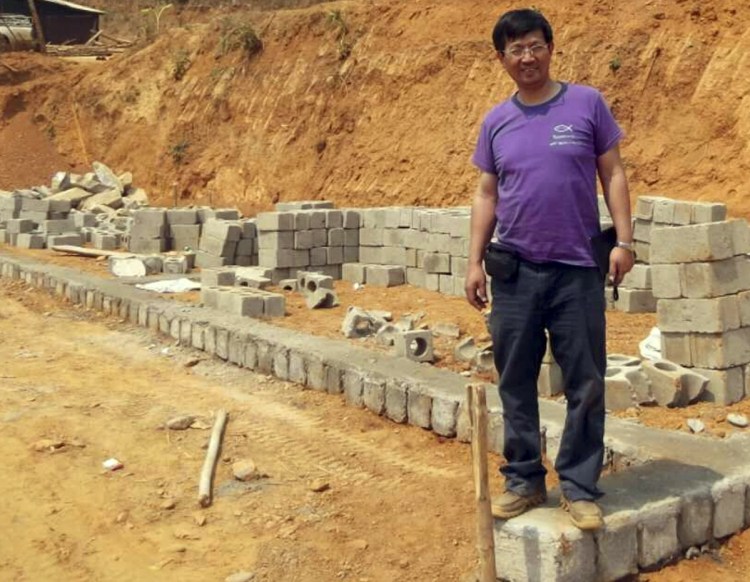BEIJING — The Rev. John Sanqiang Cao paid no more than $3 for the trip that would end up costing him his freedom.
For years, he and fellow Chinese Christian teachers would cross the river on a narrow bamboo raft from a tree-shrouded bank in southern China into neighboring Myanmar, carrying with them notebooks, pencils and Bibles. The journey that enabled the missionaries to slip between the countries – a distance no greater than 30 feet – always happened in broad daylight, according to a U.S.-based missionary who traveled with Cao.
The ride on March 5, 2017, was different. Cao and a teacher were on a raft returning to Yunnan province when they saw Chinese security agents waiting for them on the shore. Decades of work in China’s clandestine “house” churches and unofficial Bible schools had prepared the prominent 58-year-old Christian leader for this moment. He quickly threw his cellphone into the water, protecting the identities of more than 50 Chinese teachers he had recruited to give ethnic minority Burmese children a free education rooted in Christianity.
sEVEN YEARs in prison
But Cao himself could not escape. He was sentenced last month to seven years in prison for “organizing others to illegally cross the border” – a crime more commonly applied to human traffickers. His American sons and Christian colleagues – who have not been allowed contact with him since his arrest – say that the pastor’s sentence should be reduced in light of his humanitarian work.
“Nothing my father organized was ever political. It was always just religious or charitable,” said Ben Cao, the pastor’s 23-year-old son, a U.S. citizen living in Charlotte, North Carolina. “We hope that China will be merciful, and see that my father’s intentions were good.”
Cao’s punishment was handed down as Beijing pursues a plan to “sinicize” the country’s major religions, eliminate “foreign influence” and align faiths more closely with the atheist ruling Communist Party’s own doctrines. Analysts say the government increasingly views Christianity’s rise in China as a threat to its rule, and may be using prominent figures such as Cao as an example to intimidate nascent movements.
The pastor’s case also appears to show the party wants to extend its control over the activities of China’s faithful even when they are abroad.
“This reflects the tightening environment under President Xi (Jinping) against any kind of religious independence,” said Cao’s longtime friend Bob Fu, a Texas-based Christian rights activist. “In the past when they talked about foreign infiltration, they were referring to the activities of foreign missionaries inside China, but that has now expanded to include Chinese missionaries going overseas.”
New religious regulations implemented in February stipulate that Chinese nationals who leave the country for religious purposes without government authorization could be fined up to $31,780. Meanwhile, leaders of churches not approved by the state have reported being prevented from leaving mainland China outright.
A U.S. State Department spokesman said that Washington is “deeply concerned” about Cao’s sentence and has urged China to release him as a U.S. legal permanent resident on “humanitarian grounds.” Cao intends to retire and return to his family in America once he is freed, the spokesman said.
Chris Smith, a New Jersey representative who chairs a House subcommittee on human rights, said in a statement that “Pastor Cao’s name should be on President Trump’s lips whenever he talks to Xi Jinping,” China’s president.
‘sINGLED OUT’
Cao was 20 when he met an American Christian couple who were sightseeing in his hometown in central Hunan province. They gave him his first Bible and exchanged letters with him about Christianity. Cao, the eldest son of teachers, told them that he listened to the evangelist Billy Graham’s radio broadcasts and felt called to pastor the Chinese people.
So even after marrying an American woman, completing seminary studies in New York and pastoring a Chinese-American congregation in North Carolina, Cao retained his Chinese citizenship and split his time between the countries.
He became heavily involved with China’s “house” churches – Protestant congregations that are not state-sanctioned but which local authorities have in many cases tolerated. Cao founded more than a dozen Bible boarding schools in central and southern China that trained teens from poor Christian families to become unofficial pastors. Some later taught at the schools Cao built in Myanmar.
Christianity’s rapid growth, capacity to mobilize and resilience through harsh periods of persecution make it appear as a threat to the Communist Party, analysts say, particularly given its link to Western civilization.
“I suspect (Cao) was singled out for this arrest,” said Xi Lian, a scholar of Christianity in China at Duke University. Lian noted that pastors with “lower visibility” have been doing similar work along the China-Myanmar border with no repercussions, but Cao’s prominence in the house church networks made him “the kind of person that may make the Chinese government nervous.”
Send questions/comments to the editors.



Success. Please wait for the page to reload. If the page does not reload within 5 seconds, please refresh the page.
Enter your email and password to access comments.
Hi, to comment on stories you must . This profile is in addition to your subscription and website login.
Already have a commenting profile? .
Invalid username/password.
Please check your email to confirm and complete your registration.
Only subscribers are eligible to post comments. Please subscribe or login first for digital access. Here’s why.
Use the form below to reset your password. When you've submitted your account email, we will send an email with a reset code.